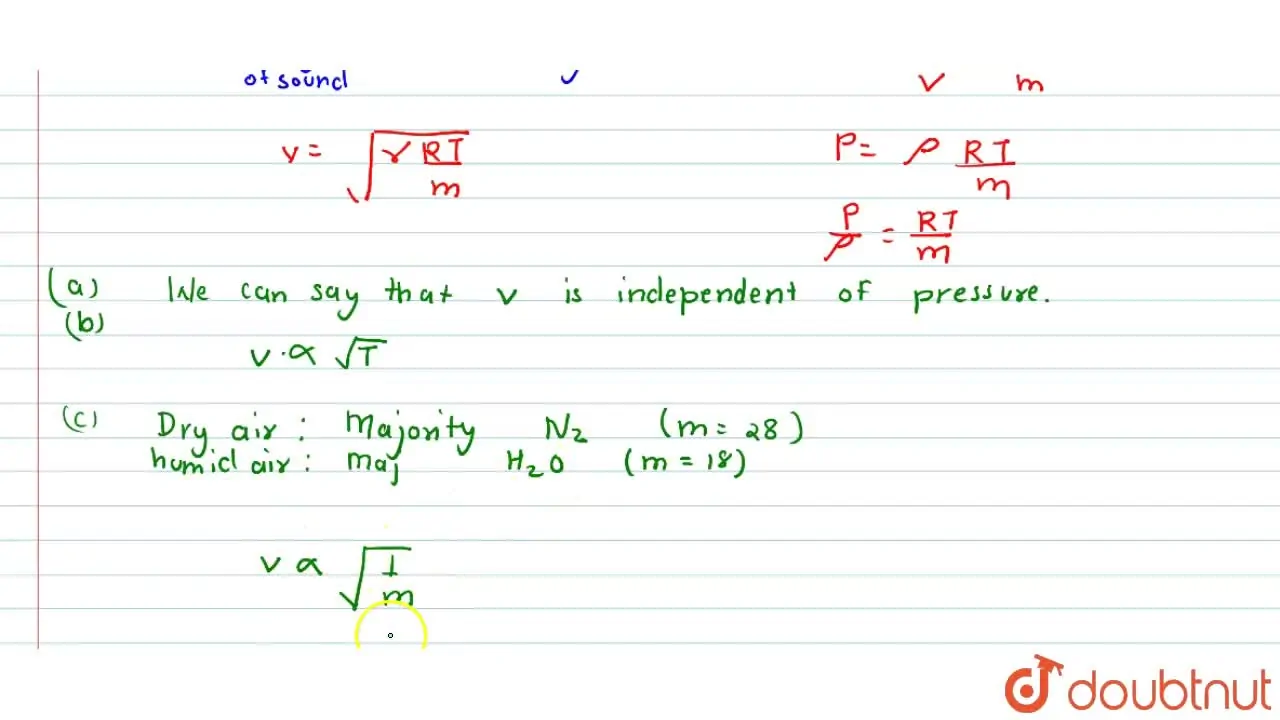Use the formula v=√γPρ to explain why the speed of sound in air
(a) is independent of pressure, (b) increases with temperature, (c) increases with humidity.
(a) Take the relation
v=√γpρ …(i)
Where,
Density, ρ=MassVolime=MV
M=Molecular weight of the gas
V= Volume of the gas
Hence, equation (i) reduces to :
v=√γPVM ...(ii)
Now from the ideal gas equation for n = 1:
PV = RT
For constant T, PV = Constant
Since both M and γ are constants, v = Constant
Hence, at a constant temperature, the speed of sound in a gaseous medium is independent of the change in the pressure of the gas.
(b) Take the relation:
v=√γpρ ...(i)
For one mole of an ideal gas, the gas equation can be written as:
PV = RT
p=RTV ...(ii)
Substituting equation (ii) in equation (i), we get
v=√γRTVρ=√γRTM ...(iv)
Where,
Mass , M=ρV is a constant
Y and R are also constants
We conclude from equation (iv) that v∝√T.
Hence, the speed of sound in a gas is directly proportional to the square root of the temperature of the gaseous medium, i.e., the speed of the sound increases with an increase in the temperature of the gaseous medium and vice versa.
(c) Let vm and vd be the speeds of sound in moist air and dry air respectively
Let ρm and ρd be the densities of moist air and dry air respectively
Take the relation
v=√γPρ...(i)
And the speed of sound in dry air is:
vd=√γPρd ...(ii)
On dividing equations (i) and (ii), we get:
vmvd=√γPρm×ρdγP=√ρdρm
However, the presence of water vapour reduces the density of air, i.e.,
ρd<ρm
∴vm>vd
Hence, the speed of sound in moist air is greater than it is in dry air. Thus, in a gaseous medium, the speed of sound increases with humidity.
Related Playlists
Similar Questions
Speed of sound waves in air a) is independent of temperature b) increases with pressure c) increases with increase in humidity d) decreases with increase in humidity.
View SolutionAssertion : Speed of sound in gass is independent of pressure of gas.
Reason : With increase in temperature of gas speed of sound will increase.View SolutionWhy does the speed of sound increase with increase in temperature?
View SolutionGraph between speed v of sound in air and pressure P at a constant temperature is given by
View SolutionWhen pressure increases by 1 atmosphere and temperature increases by 1∘ C , the velocity of sound
View SolutionOn the basis of the kinetic theory explain why the pressure of a gas at constant volume increases with rise in temperature?
View SolutionVelocity of sound in air
(I) increases with temperature
(II) decreases with temperature
(III) increase with pressure
(IV) is independent of pressure
(V) decreases with pressure
(VI) is independent of temperature Choose the correct answerView SolutionAt room temperature (27∘C) the velocity of sound in air is 330 m/s. the increase in velocity of sound when temperature is increased by 1∘C is
View SolutionShow that the velocity of sound in air increases by 0.6ms−1 for every 1∘C rise in temperature.
View SolutionAt normal temperature and pressure, the speed of sound in air is 332ms−1. What will be the speed of sound in hydrogen (i) at normal temperature and pressure (ii) at 819∘C temperature and 4 atmospheric pressure. Given air is 16 times heavier than hydrogen.
View Solution


